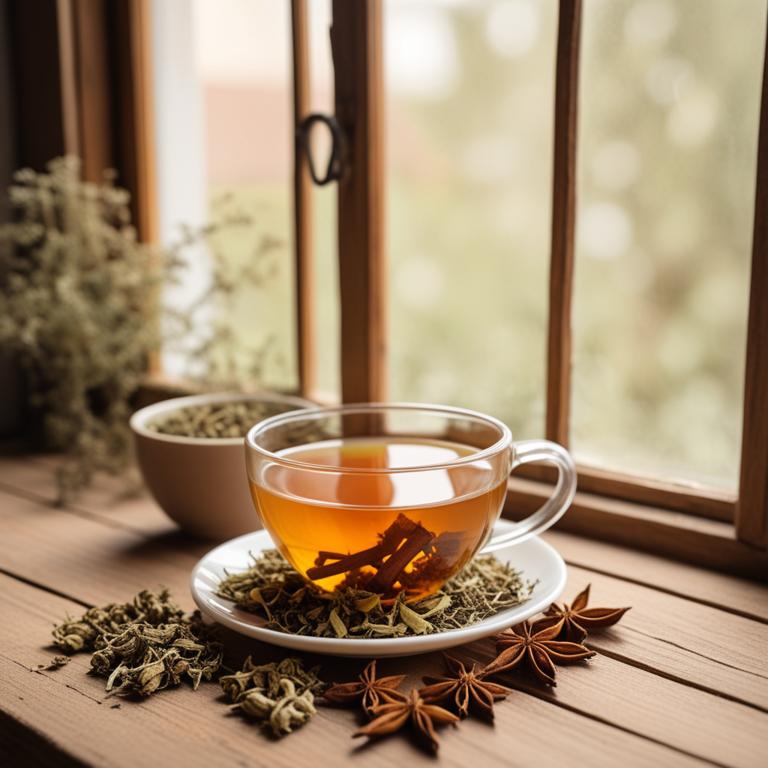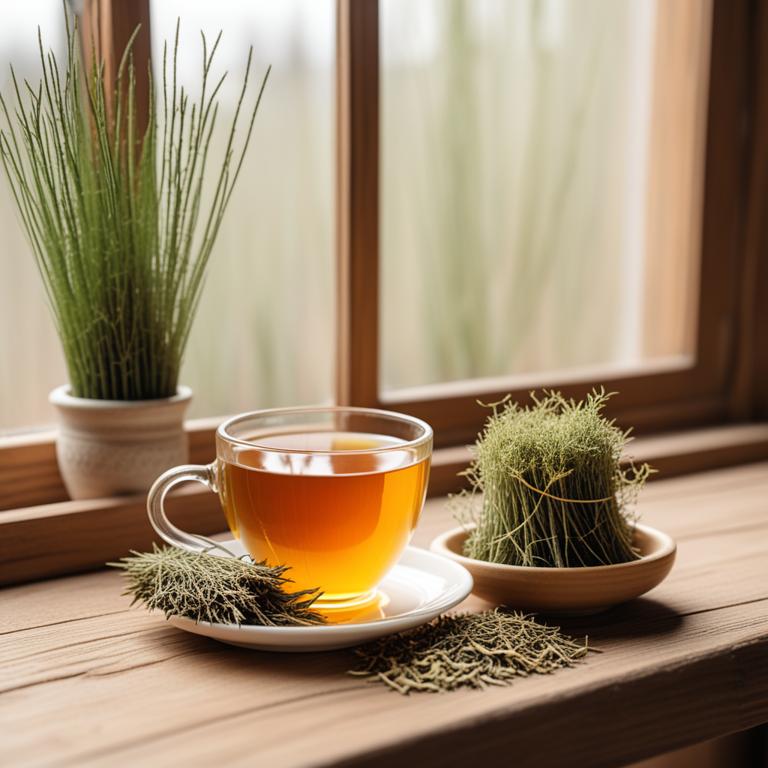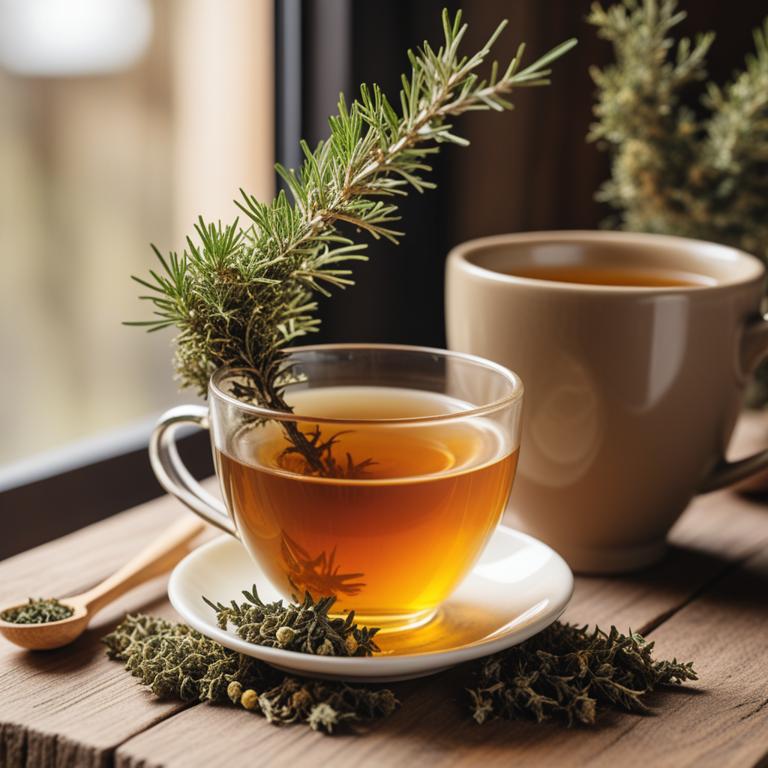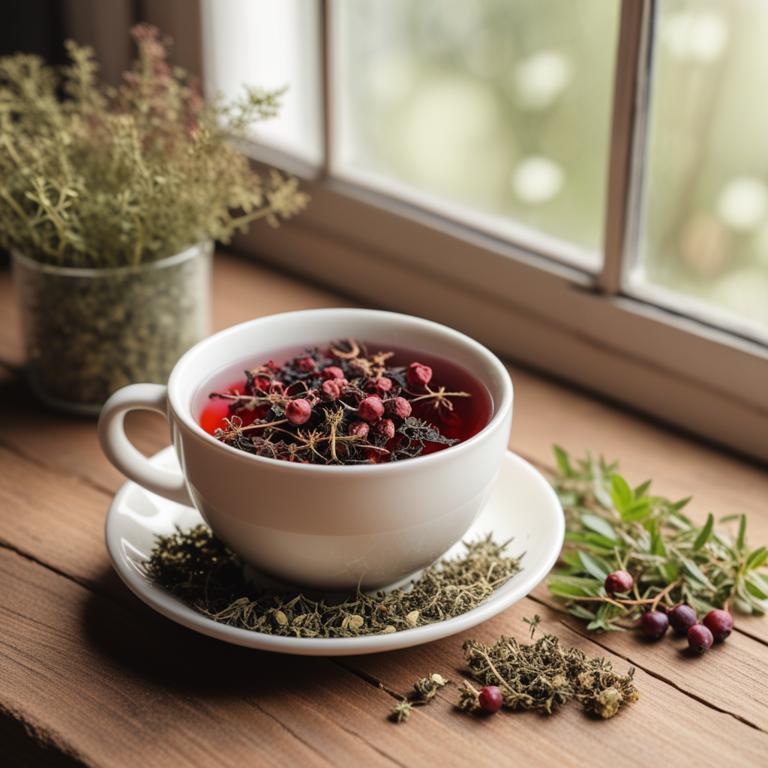10 Herbal Teas For Bladder Pain

Herbal teas can be a great natural remedy for bladder pain.
These teas work by reducing inflammation and relaxing the muscles in the bladder and urinary tract. This can help to ease discomfort and pain. Equisetum arvense, also known as horsetail, is an example of an herb that's often used to treat bladder problems. It's rich in antioxidants and has anti-inflammatory properties that can help to soothe the bladder and urinary tract. Juniperus communis, or juniper berries, is another herb that's commonly used to treat bladder issues. The berries have antiseptic and anti-inflammatory properties that can help to reduce inflammation and kill off bacteria that can cause infection.
This can help to ease symptoms of bladder pain, such as burning and discomfort while urinating. Achillea millefolium, or yarrow, is also used to treat bladder problems. It's a natural diuretic, which means it can help to increase urine production and reduce the risk of bladder infections. Drinking herbal teas like these can bring a range of benefits to your life. For one, they can provide a natural and non-addictive alternative to pain medication. This can be especially helpful if you're looking to reduce your reliance on prescription medications. Additionally, herbal teas can be a more gentle and effective way to manage bladder pain, especially if you're experiencing recurring or chronic issues.
By reducing inflammation and relaxing the muscles in the bladder and urinary tract, these teas can help to promote healing and reduce the risk of future problems.
- 1. Equisetum arvense
- 2. Juniperus communis
- 3. Achillea millefolium
- 4. Urtica dioica
- 5. Zingiber officinale
- 6. Vaccinium macrocarpon
- 7. Lavandula angustifolia
- 8. Glycyrrhiza glabra
- 9. Melissa officinalis
- 10. Cinchona pubescens
1. Equisetum arvense

Equisetum arvense teas contains bioactive constituents like silicic acid, caffeic acid, and isoflavones.
These compounds have anti-inflammatory properties that help reduce swelling and pain in the bladder. The isoflavones also work to relax the muscles in the bladder, which can become overactive and cause pain. The silicic acid in Equisetum arvense teas has antispasmodic properties, which help to calm muscle spasms and cramps in the bladder.
By reducing inflammation and relaxing muscles, Equisetum arvense teas may help alleviate bladder pain and discomfort.
- Gather 2 tablespoons of dried Equisetum arvense root or 4-6 fresh Equisetum arvense roots.
- Place the Equisetum arvense in a cup and pour 8 oz of boiling water over it.
- Let the mixture steep for 5-10 minutes. Strain the liquid using a tea strainer or cheesecloth.
- Discard the solids and transfer the liquid to a cup. You can add honey or lemon to taste.
- Drink the tea 2-3 times a day to help relieve bladder pain. Consult a doctor or pharmacist before using this remedy.
2. Juniperus communis

Juniperus communis teas contains essential oils like borneol and bornyl acetate, as well as flavonoids like kaempferol and quercetin.
These compounds have anti-inflammatory properties, which help reduce swelling and irritation in the bladder. The terpenes found in juniper berries, such as alpha-pinene and beta-pinene, have a diuretic effect, increasing urine production and flushing out bacteria and toxins that can cause pain. The flavonoids in the tea also have antioxidant properties, which help protect the bladder lining from damage and promote healing.
By reducing inflammation and promoting urine production, Juniperus communis teas can help alleviate bladder pain and discomfort.
- Gather dried Juniperus communis berries (1 tablespoon) and a cup of boiling water.
- Place the berries in a tea infuser or a small muslin bag.
- Pour the boiling water over the berries and let it steep for 5-7 minutes.
- Strain the tea and discard the berries. Add honey or sugar to taste if needed.
- Drink the tea 2-3 times a day to help relieve bladder pain.
3. Achillea millefolium

Achillea millefolium teas contains flavonoids, sesquiterpenes, and volatile oils, which are responsible for its medicinal properties.
The flavonoids, including luteolin and apigenin, have anti-inflammatory properties that can help reduce swelling and pain in the bladder. The sesquiterpenes, such as achillenol, have antimicrobial properties that can help combat bacterial infections that may be causing bladder pain. The volatile oils in the tea, including camphor and thujone, have analgesic and anti-inflammatory effects that can help alleviate pain and discomfort in the bladder.
By consuming Achillea millefolium tea, individuals may experience relief from bladder pain due to its anti-inflammatory, antimicrobial, and analgesic properties.
- Gather 1 cup of dried Achillea millefolium leaves.
- Boil 1 cup of water in a pot.
- Add 1 teaspoon of dried leaves to the boiling water.
- Reduce heat and let it simmer for 5-7 minutes.
- Strain the tea and drink 1/2 cup, 2-3 times a day for relief.
4. Urtica dioica

Urtica dioica teas contains flavonoids, particularly quercetin and kaempferol, that have anti-inflammatory properties.
These compounds help to reduce swelling and irritation in the bladder, which can cause pain. The tea also contains tannins, which act as a natural antiseptic to prevent infection. Additionally, the flavonoids in Urtica dioica have a soothing effect on the bladder muscles, helping to relax them and reduce spasms.
By reducing inflammation, preventing infection, and relaxing the bladder muscles, Urtica dioica teas can provide relief from bladder pain.
- Gather 1 cup of fresh or dried Urtica dioica leaves.
- Use 1/2 cup of the leaves for every 8 oz of water. If using dried leaves, use 1/4 cup.
- Heat 8 oz of water in a pot until it's hot but not boiling.
- Add the Urtica dioica leaves to the hot water and let it steep for 5-7 minutes.
- Strain the tea and drink 1 cup, 2-3 times a day, to help relieve bladder pain.
5. Zingiber officinale

Zingiber officinale teas contains gingerols and shogaols as its bioactive constituents, which have anti-inflammatory properties that help reduce swelling and pain in the bladder.
The volatile oils in ginger, such as gingerol and shogaol, have been shown to relax the muscles in the bladder, making it easier to urinate and reducing discomfort. The anti-inflammatory properties of gingerols and shogaols also help to reduce inflammation in the bladder, which can cause pain and discomfort. Additionally, the antioxidants in ginger help to protect the bladder from damage caused by free radicals, which can contribute to pain and discomfort.
The relaxation of the bladder muscles and reduction of inflammation in the bladder make Zingiber officinale teas a potential remedy for bladder pain.
- Get 1 teaspoon of dried Zingiber officinale root.
- Pour 1 cup of boiling water over the root in a cup.
- Steep for 5-7 minutes, then strain the liquid.
- Add honey or sugar to taste, if needed.
- Drink the tea 2-3 times a day for bladder pain relief.
Zingiber Officinale Tea on Amazon
FGO Organic Ginger Tea, 100 Count, Eco-Conscious Tea Bags, Caffeine Free, Packaging May Vary (Pack of 1)
Disclaimer: We earn a commission if you click this link and make a purchase at no additional cost to you.
6. Vaccinium macrocarpon

Vaccinium macrocarpon teas contains anthocyanins and ellagic acid as its bioactive constituents.
Anthocyanins have anti-inflammatory properties that help reduce swelling and pain in the bladder. Ellagic acid has antioxidant properties that protect the bladder from damage caused by free radicals. This damage can lead to bladder pain and discomfort.
The anti-inflammatory and antioxidant properties of Vaccinium macrocarpon teas may help alleviate bladder pain by reducing inflammation and protecting the bladder from damage.
- Gather 1 cup of dried Vaccinium macrocarpon (cranberry) leaves.
- Measure 1 tablespoon of dried Vaccinium macrocarpon leaves and place in a tea infuser.
- Pour 1 cup of boiling water over the leaves in the tea infuser.
- Steep for 5-7 minutes. Strain the tea into a cup.
- Drink the tea 2-3 times a day to help relieve bladder pain.
7. Lavandula angustifolia

Lavandula angustifolia teas contains several bioactive constituents, including linalool, linalyl acetate, and camphor, that contribute to its therapeutic properties.
These compounds have antispasmodic and anti-inflammatory effects, which can help to relax the muscles in the bladder and reduce pain. The antispasmodic properties of Lavandula angustifolia teas can also help to prevent spasms in the bladder, which can cause painful contractions. Additionally, the anti-inflammatory properties of these compounds can help to reduce inflammation and swelling in the bladder, which can contribute to pain.
By reducing muscle spasms and inflammation, Lavandula angustifolia teas may provide relief from bladder pain.
- Gather 1 cup of boiling water, 1 tablespoon of dried Lavandula angustifolia flowers, and a tea infuser or strainer.
- Place the dried flowers in the tea infuser or strainer.
- Pour the boiling water over the flowers and let it steep for 5-7 minutes.
- Strain the tea and discard the flowers. You can add honey or lemon to taste, if needed.
- Drink 1-2 cups of the tea, 2-3 times a day, to help alleviate bladder pain.
8. Glycyrrhiza glabra

Glycyrrhiza glabra teas contains a compound called glycyrrhizin, which is known for its anti-inflammatory and antioxidant properties.
Glycyrrhizin works by reducing inflammation in the bladder and soothing the muscles that surround it, helping to ease pain and discomfort. The tea also contains flavonoids, such as luteolin and kaempferol, which have been shown to have a calming effect on the bladder and reduce spasms. Additionally, glycyrrhizin has a mild diuretic effect, which helps to flush out toxins and excess fluids that can irritate the bladder and contribute to pain.
By combining these properties, Glycyrrhiza glabra teas can help to provide relief from bladder pain and discomfort.
- Get 1 cup of boiling water and a tea infuser.
- Add 1-2 tablespoons of dried Glycyrrhiza glabra root to the tea infuser.
- Steep the root in the boiling water for 5-7 minutes.
- Strain the tea and discard the root. Add honey to taste.
- Drink the tea 2-3 times a day for bladder pain relief.
9. Melissa officinalis

Melissa officinalis teas contains compounds like rosmarinic acid, luteolin, and apigenin.
These bioactive constituents have anti-inflammatory and antioxidant properties that can help soothe and calm the bladder. The rosmarinic acid in Melissa officinalis tea has been shown to reduce inflammation and relax the muscles in the bladder, which can help alleviate pain and discomfort. The antioxidant properties of luteolin and apigenin can also help protect the bladder from damage and promote healing.
By reducing inflammation and promoting relaxation, Melissa officinalis tea can provide relief from bladder pain and discomfort.
- Gather 1 cup of fresh Melissa officinalis leaves or 1 teaspoon of dried leaves.
- Boil 1 cup of water in a pot.
- Add the Melissa officinalis leaves to the boiling water.
- Reduce heat and let it steep for 5-7 minutes.
- Strain the tea and drink 1/2 cup, 2-3 times a day.
10. Cinchona pubescens

Cinchona pubescens teas contains alkaloids such as quinine, cinchonine, and cinchonidine, which are known for their anti-inflammatory and antispasmodic properties.
These compounds help relax the muscles in the bladder and reduce inflammation, making it a potential remedy for bladder pain. The antispasmodic properties of cinchonine and cinchonidine also help to calm down spasms in the bladder and urinary tract, providing relief from discomfort and pain. Additionally, quinine has a diuretic effect, which helps to increase urine production and reduce the risk of bladder infections that can cause pain.
By combining these properties, Cinchona pubescens teas may provide relief from bladder pain by reducing inflammation, spasms, and infection risk.
- Gather 2 tablespoons of dried Cinchona pubescens bark.
- Add the Cinchona bark to 1 cup of boiling water.
- Reduce heat and let it simmer for 10-15 minutes.
- Strain the tea into a cup and discard the Cinchona bark.
- Drink the tea warm, 2-3 times a day, for bladder pain relief.